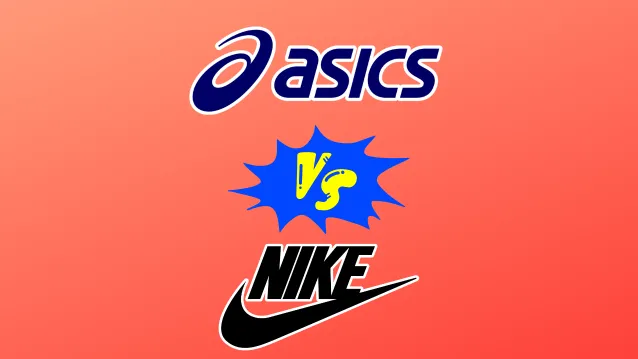As an avid runner, I understand the importance of having the right pair of shoes. When it comes to top athletic brands for runners, ASICS and Nike are two of the biggest names.
In this article, I’ll compare these two powerhouse brands across a range of factors like comfort, durability, performance, style, and more. Whether you’re a beginner or experienced runner, read on to learn which brand may be the better fit for your running needs.
Comparison Table
| Category | ASICS | Nike |
|---|---|---|
| Founded | 1949 | 1964 |
| Comfort & Fit | Excellent comfort with anatomical design. Offer different fits like narrow, wide, etc. | Great comfort but some may find narrow fit. Limited wide options. |
| Color Options | Wide range of colors | Extensive color options |
| Durability | Very durable, high mileage shoes | Good durability, average 300-500 miles |
| Performance | Excellent shock absorption and support. Ideal for runners. | Great performance features like cushioning and responsiveness. Good for various sports. |
| Design & Style | More classic and understated look | Very stylish and athletic aesthetic |
| Popularity | Less popular than brands like Nike | Extremely popular around the world |
| Best Selling Model | ASICS Gel-Kayano | Nike Air Force 1 |
ASICS Overview
Asics was founded way back in 1949 by Kihachiro Onitsuka in Kobe, Japan.

The name “Asics” actually comes from the Latin phrase “anima sana in corpore sano,” which translates to “healthy soul in a healthy body.” Asics shoes really align with that mission, aiming to provide runners with equipment that enables peak performance.
Throughout its long history, Asics has continuously innovated and evolved its shoe technologies.
Key components that provide the renowned Asics fit and feel include the IGS (Impact Guidance System) for a natural gait cycle, Trusstic System tech for light stability, SpevaFoam cushioning for soft landings, and Dynamic DuoMax support for optimal alignment.
The outer soles utilize Asics’ specialized rubber compounds called AHAR (Asics High Abrasion Rubber) that hold up to heavy mileage on roads.
From fast, feather-light racing flats to well-cushioned trainers, Asics offers a diverse range of running shoe models to suit different needs.
But across the board, Asics shoes are known for their structured, classic look and feel.
If you want a running shoe with proven performance and durability from a brand that’s withstood the test of time, Asics is a solid choice.
Nike Overview
Nike was founded in 1964 by Bill Bowerman and Phil Knight as Blue Ribbon Sports, initially importing Japanese running shoes before establishing their own footwear manufacturing in the 1970s.

Nike popularized innovations like the waffle outsole and air cushioning technology, earning the brand a reputation for performance and style.
Today, Nike is the largest athletic shoe company in the world, producing footwear and apparel for virtually every sport imaginable.
In running specifically, Nike is the undisputed market leader, offering an enormous range of shoes tailored for competition, training, and every day running at varying price points. The Nike Pegasus, introduced in the 1980s, remains one of their most ubiquitous neutral trainers.
Other pioneering technologies include Shox columns for impact absorption and lightweight Flyknit uppers. As a global brand active in sports science research, Nike employs state-of-the-art product testing to create performance-driven footwear.
Recent releases like the Alphafly NEXT% racing shoe with carbon fiber plates demonstrate Nike’s commitment to pushing boundaries. For runners of all levels, Nike offers both cutting-edge models as well as classic staples like the Air Zoom Pegasus.
With its iconic Swoosh logo and pervasive marketing and sponsorship, Nike has become one of the most recognizable brands worldwide.
Major Differences Between the Brands
Comfort and Fit
Both brands offer comfortable shoes, but ASICS edges out Nike when it comes to anatomical design elements that provide tailored support. ASICS shoes conform to the foot’s natural shape and movement patterns. They also come in more foot-type specific options like wide and narrow sizes. Some Nike shoes have a narrower fit that may not work for all foot shapes.
Durability and Performance
ASICS shoes are built to last, with some models easily covering 500+ miles. The FlyteFoam and Gel technologies provide excellent energy return mile after mile. Nike also makes durable shoes but some may start deteriorating around 300-500 miles. For performance, Nike excels for athletic activities beyond just running. ASICS has a laser focus on creating shoes tailored to runners’ biomechanics.
Price
Both brands offer models at varied price points but ASICS shoes are generally more affordable than Nikes at the same capability level. The advanced technology and premium materials of some Nike shoes push up the price. ASICS delivers exceptional features and comfort at a more reasonable cost.
Design and Style
Nike wins when it comes to sleek aesthetics and streetwear appeal. Even their performance shoes have an athletic, fashion-forward look. ASICS shoes have a more minimal, classic style. For runners focused on function over flash, ASICS streamlined look may appeal more. But Nike dominates in the style department.
Popularity
With its athletic image and “Just Do It” slogan, Nike has undoubtedly won the popularity contest. Its shoes and apparel are internationally recognized status symbols. ASICS simply doesn’t have that kind of famous brand clout. But ASICS remains a leader in high-quality, functional athletic footwear.
Target Market
ASICS positions itself for serious runners looking for the next level of performance. Nike has mass market appeal not just for runners but the wider world of sports and athletic fashion. If your goal is to run a marathon or beat your 5K time, ASICS precise engineering will help optimize your performance.
Performance Comparison
For Nurses
For nurses who are on their feet all day, ASICS Gel-Kayano line provides excellent cushioning and arch support to fight fatigue. The roomy toe box minimizes irritation.
Nike Air Zoom Pulse is also a good option with a slip-on design and smooth interior to keep feet comfortable during long shifts. Ultimately ASICS offers foot-hugging comfort that nurses need.
For Walking
ASICS Gel-Tech Walker Neo Walking shoes have optimum cushioning and shock attenuation for low-impact walking as well as moisture management. Nike Downshifter 11 has good shock absorption but may not provide enough arch support for long walks. ASICS takes the lead for a comfortable walking stride.
For Running
ASICS is designed specifically with runners in mind with anatomical design to match natural foot motion. The MetaRide line has exceptional bounce back and energy return for a smoother run.
Nike ZoomX Vaporfly NEXT% also offers impressive energy return with a carbon fiber plate but the narrow fit may not work for some. For serious runners, ASICS takes the gold.
For Flat Feet
ASICS Gel-Kayano provides excellent stability and arch support through features like the Dynamic DuoMax system. Nike Zoom Structures can also support flat feet but some models are not wide enough. With foot-hugging support, ASICS is the clear choice for flat feet.
For High Arches
The ASICS Gel-Nimbus line has plush cushioning and robust arch support to relieve pressure on high arches. Nike Air Zoom Pegasus also works well for high arches with ample cushioning through the midsole. Both work but the customized fit of ASICS makes it the winner.
For Back Pain
ASICS Gel-Kayano has excellent cushioning and guidance that absorbs impact to prevent jarring of the spine. Nike Epic React Flyknit is also very cushioned but may not stabilize the foot enough. The stability of ASICS gives it the advantage for easing back pain.
For Standing All Day
The ASICS Gel-Contend line has cushioning and arch support to fight fatigue from standing all day. Nike Air Monarch IV is also cushioned but heavier than some ASICS options. Overall, the well-engineered support of ASICS shoes helps reduce discomfort from long periods standing.
For Hiking
The ASICS Gel-Venture 7 is durably constructed to handle rugged terrain with grippy traction and a stabilizing plate. Nike ACG Air Nasu supports rough hikes too but has less structured arch support. For challenging hikes, the stability and construction quality of ASICS comes out on top.
For Plantar Fasciitis
ASICS Gel-Kayano has excellent arch support and cushioning to relieve pressure on the plantar fascia. Nike Zoom Winflo also absorbs shock but may not correct overpronation as well. For reducing pain from this condition, ASICS is the clear choice.
Final Verdict
When it comes to choosing between ASICS and Nike, both brands make high quality athletic shoes but they excel in different areas.
For runners and athletes focused purely on performance, ASICS is the clear winner. The anatomically designed fit, targeted support features, and cushioning technologies like FlyteFoam and Gel make ASICS shoes best suited for optimizing comfort and gait efficiency during running or sports.
Nike has an edge when it comes to style, brand recognition, and versatility across a wide range of sports. However, some Nike shoes compromise fit and specialized support for aesthetics.
Ultimately, your choice between these two brands depends on your priorities. If you want shoes tailored to enhance running biomechanics and reduce injury risk, go with ASICS. If you care more about looks and multi-sport functionality, Nike is the way to go. For pronated feet or foot pain issues, ASICS purpose-built support cannot be beat.
By understanding the strengths of each brand, you can make the best choice to meet your athletic and lifestyle needs. ASICS and Nike both make quality shoes so you can’t go wrong, but your individual fit and performance preferences can help determine which brand is right for you.


